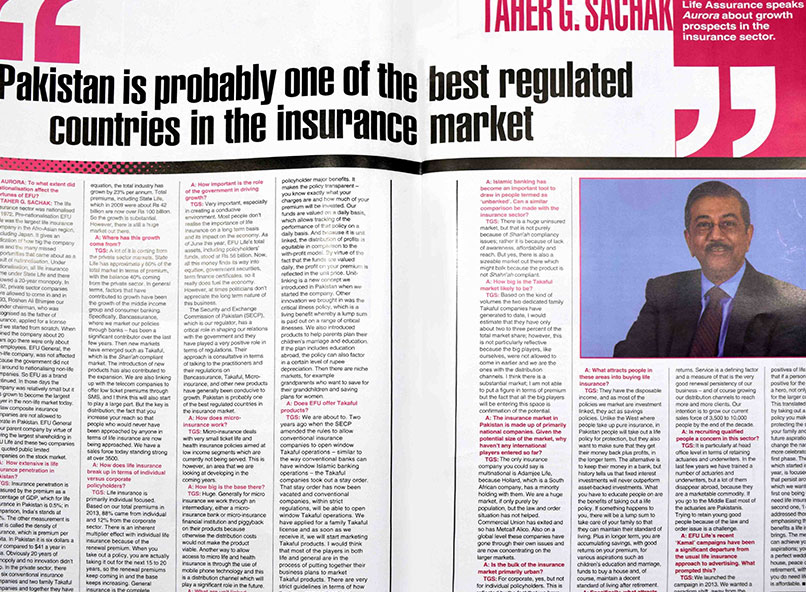AURORA: To what extent did nationalisation affect the fortunes of EFU?
TAHER G. SACHAK: The life insurance sector was nationalised in 1972. Pre-nationalisation EFU Life was the largest life insurance company in the Afro-Asian region, excluding Japan. It gives an indication of how big the company was and the many missed opportunities that came about as a result of nationalisation. Under nationalisation, all life insurance came under State Life and there followed a 20-year monopoly.
In 1992, private sector companies were allowed to come in and in 1993, Roshen Ali Bhimjee our founder chairman, who was recognised as the father of insurance, applied for a license and we started from scratch. When I joined the company about 20 years ago there were only about 10 employees. EFU General, the non-life company, was not affected because the government did not get around to nationalizing non-life companies. So EFU as a brand continued. In those days the company was relatively small but it has grown to become the largest player in the non-life market today. By law composite insurance companies are not allowed to operate in Pakistan. EFU General is our parent company by virtue of having the largest shareholding in EFU Life and these two companies are quoted public limited companies on the stock market.
AURORA: How extensive is life insurance penetration in Pakistan?
TGS: Insurance penetration is measured by the premium as a percentage of GDP, which for life insurance in Pakistan is 0.5%; in comparison, India's stands at 3.1%. The other measurement is what is called the density of insurance, which is premium per capita. In Pakistan it is six dollars a year compared to $41 a year in India. Obviously 20 years of monopoly and no innovation didn't help. In the private sector, there are six conventional insurance companies and two-family Takaful companies and together they have grown at an average of about 30% per annum over the last five years, and if you include State Life in the equation, the total industry has grown by 23% per annum. Total premiums, including State Life, which in 2009 were about Rs 42 billion are now over Rs 100 billion. So the growth is substantial.
However, there is still a huge market out there.
AURORA: Where has this growth come from?
TGS: A lot of it is coming from the private sector markets. State Life has approximate y 60% of the total market in terms of premium, with the balance 40% coming from the private sector. In general terms, factors that have contributed to growth have been the growth of the middle-income group and consumer banking. Specifically, Bancassurance, where we market our policies through banks - has been a significant contributor over the last few years. Then new markets have emerged such as Takaful, which is the Shariah compliant market. The introduction of new products has also contributed to the expansion. We are also linking up with the telecom companies to offer low ticket premiums through SMS, and I think this will also start to play a large part. But the key is distribution; the fact that you increase your reach so that people who would never have been approached by anyone in terms of life insurance are now being approached. We have a sales force today standing strong at over 3500.
AURORA: How does life insurance break up in terms of individual versus corporate policyholders?
TGS: Life insurance is primarily individual focused. Based on our total premiums in 2013, 88% came from individual and 12% from the corporate sector. There is an inherent multiplier effect with individual life insurance because of the renewal premium. When you take out a policy, you are actually taking it out for the next 15 to 20 years, so the renewal premiums keep coming in and the base keeps increasing. General insurance is the complete opposite; it is tilted towards corporate because the nature of the business is very different.
AURORA: How important is the role of the government in driving growth?
TGS: Very important, especially in creating a conducive environment. Most people don't realize the importance of life insurance on a long term basis and its impact on the economy. As of June this year, EFU Life's total assets, including policyholders funds, stood at Ris 56 billion. Now, all this money finds its way into equities, government securities, term finance certificates, so it really does fuel the economy. However, at times politicians don't appreciate the long term nature of this business. The Security and Exchange Commission of Pakistan (SECP), which is our regulator, has a critical role in shaping our relations with the government and they have played a very positive role in terms of regulations. Their approach is consultative in terms of talking to the practitioners and their regulations on Bancassurance, Takaful, Micro-insurance, and other new products have generally been conducive to growth. Pakistan is probably one of the best regulated countries in the insurance market.
AURORA: How does micro-insurance work?
TGS: Micro-insurance deals with very small ticket life and health insurance policies aimed at low income segments which are currently not being served. This is however, an area that we are looking at developing in the coming years.
AURORA: How big is the base there?
TGS: Huge. Generally for micro insurance we work through an intermediary, either a micro-insurance bank or micro-insurance financial institution and piggyback on their products because otherwise the distribution costs would not make the product viable. Another way to allow access to micro life and health insurance is through the use of mobile phone technology and this is a distribution channel which will play a significant role in the future.
AURORA: What are unit linked policies?
TGS: In simple terms, unit linked policies gives the policyholder major benefits. It makes the policy transparent - you know exactly what your charges are and how much of your premium will be invested. Our funds are valued on a daily basis, which allows tracking of the performance of that policy on a daily basis. And bricause it is unit linked, the distibution of profits is equitable in comperison to the with-profit model. By virtue of the fact that the funds are valued daily, the profit on your premium is reflected in the unit price. Unit- linking is a new concept we introduced in Pakistan when we started the company. Other innovation we brought in was the critical illness policy, which is a living benefit whereby a lump sum is paid out on a range of critical illnesses. We also introduced products to help parents plan their children's marriage and education. If the plan includes education abroad, the policy can also factor in a certain level of rupee depreciation. Then there are niche markets, for example grandparents who want to save for their grandchildren and saving plans for women.
AURORA: Does EFU offer Takaful products?
TGS: We are about to. Two years ago when the SECP amended the rules to allow conventional insurance companies to open window Takaful operations - similar to the way conventional banks can have window Islamic banking operations - the Takaful companies took out a stay order. That stay order has now been vacated and conventional companies, within strict regulations, will be able to open window Takaful operations. We have applied for a family Takaful license and as soon as we receive it, we will start marketing Takaful products. I would think that most of the players in both life and general are in the process of putting together their business plans to market Takaful products. There are very strict guidelines in terms of how the two - conventional and Takaful - are kept separate in terms of operations, assets and liabilities.
AURORA: Islamic banking has become an important tool to draw in people termed as 'unbanked'. Can a similar comparison be made with the insurance sector?
TGS: There is a huge uninsured market, but that is not purely because of Shari'ah compliancy issues; rather it is because of lack of awareness, affordability and reach. But yes, there is also a sizeable market out there which might balk because the product is not Shahri ah compliant.
AURORA: How big is the Takaful market likely to be?
TGS: Based on the kind of volumes the two dedicated family Takaful companies have generated to date, I would estimate that they have only about two to three percent of the total market share; however, this is not particularly reflective because the big players, like ourselves, were not allowed to come in earlier and we are the ones with the distribution channels. I think there is a substantial market; I am not able to put a figure in terms of premium but the fact that all the big players will be entering this space is confirmation of the potential.
AURORA: The insurance market in Pakistan is made up of primarily national companies. Given the potential size of the market, why haven't any international players entered so far?
TGS: The only insurance company you could say is multinational is Adamjee Life, because Hollard, which is a South African company, has a minority holding with them. We are a huge market, if only purely by population, but the law and order situation has not helped. Commercial Union has exited and so has Metcalf Alico. Also on a global level these companies have gone through their own issues and are now concentrating on the larger markets.
AURORA: Is the bulk of the insurance market primarily urban?
TGS: For corporate, yes, but not for individual policyholders. This is reflected by the fact that we 170-plus branches and many are in tier two and three cities and towns in Pakistan.
AURORA: What attracts people in these areas into buying life insurance?
TGS: They have the disposable income, and as most of the policies we market are investment linked, they act as savings policies. Unlike the West where people take up pure insurance, in Pakistan people will take out a life policy for protection, but they also want to make sure that they get their money back plus profits, in the longer term. The alternative is to keep their money in a bank, but history tells us that fixed interest investments will never outperform asset-backed investments. What you have to educate people on are the benefits of taking out a life policy. If something happens to you, there will be a lump sum to take care of your family so that they can maintain their standard of living. Plus in longer term, you are accumulating savings, with good returns on your premium, for various aspirations such as children's education and marriage, funds to buy a house and, of course, maintain a decent standard of living after retirement.
AURORA: Specifically, what attracts such people to EFU Life?
TGS: The products we offer and the performance in terms of the returns. Service is a defining factor and a measure of that is the very good renewal persistency of our business - and of course growing our distribution channels to reach more and more clients. Our intention is to grow our current sales force of 3,500 to 10,000 people by the end of the decade.
AURORA: Is recruiting qualified people a concern in this sector?
TGS: It is particularly at head office level in terms of retaining actuaries and underwriters. In the last few years we have trained a number of actuaries and underwriters, but a lot of them disappear abroad, because they are a marketable commodity. If you go to the Middle East most of the actuaries are Pakistanis. Trying to retain young good people because of the law and order issue is a challenge.
AURORA: EFU Life's recent 'Kamal' campaigns have been a significant departure from the usual life insurance approach to advertising. What prompted this?
TGS: We launched the campaign in 2013. We wanted a paradigm shift, away from the usual life insurance advertising which tends to be fear based, to an approach that looked at the positives of life. The concept was that if a person does something positive for the family, he becomes a hero, not only for the family but for the larger community as well. This translated into the idea that by taking out a life insurance policy you make a difference by protecting the standard of living of your family and also achieve your future aspirations. We wanted to change the narrative and make it more celebratory. That was the first phase. The second phase, which started in September this year, is focused on the two myths that persist around our industry which we wanted to address. The first one being that 1 don't really need life insurance' and the second one, 1 can't afford it. We addressed those myths by emphasizing the value of the benefits a life insurance policy brings. The message was that you can achieve your dreams and aspirations; your child's education, a perfect wedding, owning a house, peace of mind, comfort in retirement, with life insurance. So you do need life insurance, and it is affordable.















